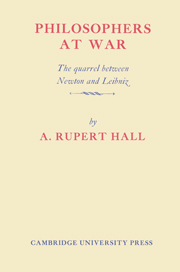Book contents
- Frontmatter
- Contents
- Preface
- Chronological Outline
- 1 Introduction
- 2 Beginnings in Cambridge
- 3 Newton states his claim: 1685
- 4 Leibniz encounters Newton: 1672–1676
- 5 The emergence of the calculus: 1677–1699
- 6 The outbreak: 1693–1700
- 7 Open warfare: 1700–1710
- 8 The philosophical debate
- 9 Thrust and parry: 1710–1713
- 10 The dogs of war: 1713–1715
- 11 War beyond death: 1715–1722
- Appendix: Newton's “Account of the Book entituled Commercium Epistolicum”
- Notes
- Index
2 - Beginnings in Cambridge
Published online by Cambridge University Press: 16 October 2009
- Frontmatter
- Contents
- Preface
- Chronological Outline
- 1 Introduction
- 2 Beginnings in Cambridge
- 3 Newton states his claim: 1685
- 4 Leibniz encounters Newton: 1672–1676
- 5 The emergence of the calculus: 1677–1699
- 6 The outbreak: 1693–1700
- 7 Open warfare: 1700–1710
- 8 The philosophical debate
- 9 Thrust and parry: 1710–1713
- 10 The dogs of war: 1713–1715
- 11 War beyond death: 1715–1722
- Appendix: Newton's “Account of the Book entituled Commercium Epistolicum”
- Notes
- Index
Summary
In 1718 a French Huguenot refugee in London, Pierre Des Maizeaux, a professional author, was putting the finishing touches to a new book. It was to be a Collection of Various Pieces on Philosophy, Natural Religion, History, Mathematics etc by Messrs Leibniz, Clarke, Newton and other famous Authors and was only to appear at Amsterdam two years later, in fact. The pieces concerned aspects of the difference in outlook that had for a number of years divided British scholars from the scholars of the Continent. Among the Europeans, Gottfried Wilhelm Leibniz had, throughout that period of division, stood out as the leading figure, whereas the creator of the ideas that had brought Britain into conflict with Europe was Isaac Newton. Part of the difference in ideas was wittily summarized some years later by Voltaire (for it was to continue considerably longer):
A Frenchman, who arrives in London, will find philosophy like every thing else very much changed there. He had left the world a plenum, and he now finds it a vacuum. At Paris the universe is seen composed of vortices of subtile matter; but nothing like it is seen in London. In France it is the pressure of the moon that causes the Tides; but in England it is the sea that gravitates towards the moon; so that when you think that the moon should make it flood with us, those gentlemen fancy it should ebb, which, very unluckily, cannot be proved … According to your Cartesians, everything is performed by an impulsion, of which we have very little notion; and according to Sir Isaac Newton, it is by an attraction, the cause of which is as much unknown to us. […]
- Type
- Chapter
- Information
- Philosophers at WarThe Quarrel between Newton and Leibniz, pp. 10 - 23Publisher: Cambridge University PressPrint publication year: 1980
- 1
- Cited by

